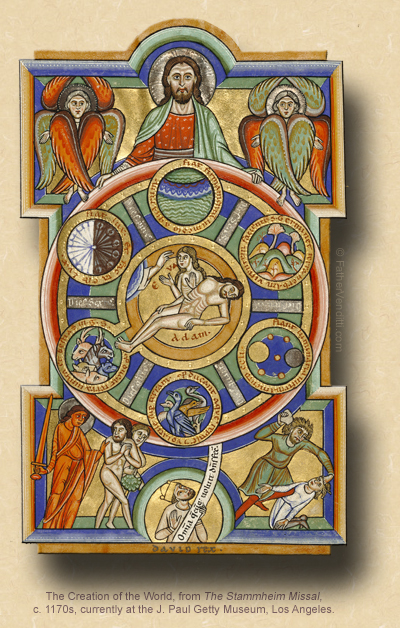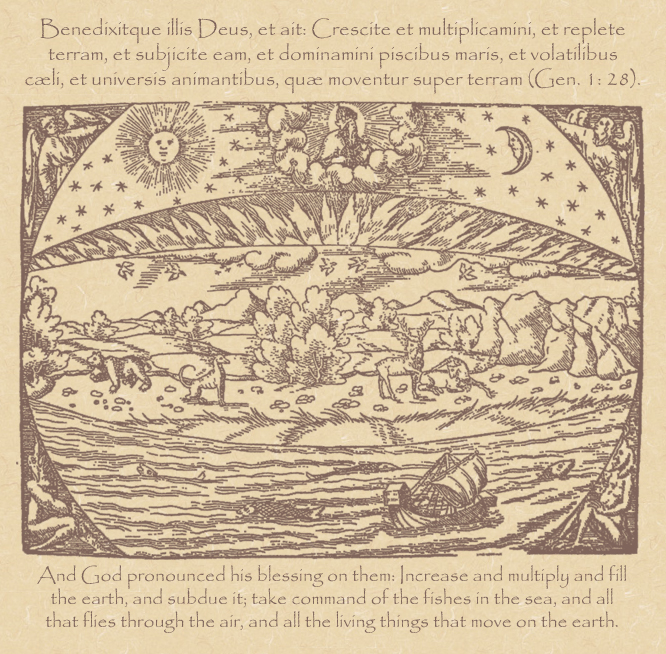Yes, You Are Your Brother's Keeper.
The Sixth Monday of Ordinary Time.
Lessons from the primary feria, according to the ordinary form of the Roman Rite:
• Genesis 4: 1-15, 25.
• Psalm 50: 1, 8, 16-17, 20-21.
• Mark 8: 11-13.
Septuagesima Monday; and, the Commemoration of Saint Simeon, Bishop & Martyr.*
Lessons from the dominica,** according to the extraordinary form of the Roman Rite:
• I Corinthians 9: 24-27; 10: 1-5.
• [Gradual] Psalm 9: 10-11, 19-20.
• [Tract] Psalm 129: 1-4.
• Matthew 20: 1-16.
|
If a Mass for the commemoration is taken, lessons from the common "Státuit…" of a Martyr Bishop:
• James 1: 12-18.
• [Gradual] Psalm 88: 21-23.
• [Tract] Psalm 20: 3-4.
• Luke 14: 26-33.
|
FatherVenditti.com
|
9:11 AM 2/18/2019 — While the Gospel lessons last week and this week seem perfunctory and brief, the first lessons during these days have been taking us through the Book of Genesis: the story of the creation, the fall of man and, today, the saga of Cain and Able. Whether these opening chapters of the first book of the Bible are real or a parable is—believe it or not—not all that important; what is important is that we understand what they teach us about God, ourselves and our relationship to Him.
Both accounts of the creation of the world—one stretched out over seven days and the other having it all done at once—describe a created world that’s perfect in every way. Man, too, is perfect, but he’s created with a free will because the love and friendship of someone who is not free is meaningless; and, God and man were friends in the early verses, walking together in the cool of the evening.  But then, disobedience and betrayal. What was the sin of Adam and Eve? It wasn't just eating an apple that, for totally arbitrary reasons, was forbidden to them; the fruit was from the Tree of the Knowledge of Good and Evil, and the act of eating it symbolizes the attempt to take away from God the power to decide good from evil and decide it for ourselves; in other words, the sin of Adam was the sin of wanting to be God, repeated in each one of us every time we set aside God’s law and decide for ourselves what’s right and wrong. That’s why it’s called the “Original Sin,” because all sin stems from it. And man paid a penalty, as the Book of Genesis tells us: our food and livelihood are no longer supplied by God, but by the sweat of our brow; the nakedness of our bodies ceases to be a thing of beauty and becomes a source of temptation; even the pain of a woman in childbirth, Genesis tells us, is the result of that one first sin. So terrible is that sin—usurping the authority of God and deciding for ourselves the difference between right and wrong—that its effects are passed on through every generation, which is why we are born in this state of Original Sin. But then, disobedience and betrayal. What was the sin of Adam and Eve? It wasn't just eating an apple that, for totally arbitrary reasons, was forbidden to them; the fruit was from the Tree of the Knowledge of Good and Evil, and the act of eating it symbolizes the attempt to take away from God the power to decide good from evil and decide it for ourselves; in other words, the sin of Adam was the sin of wanting to be God, repeated in each one of us every time we set aside God’s law and decide for ourselves what’s right and wrong. That’s why it’s called the “Original Sin,” because all sin stems from it. And man paid a penalty, as the Book of Genesis tells us: our food and livelihood are no longer supplied by God, but by the sweat of our brow; the nakedness of our bodies ceases to be a thing of beauty and becomes a source of temptation; even the pain of a woman in childbirth, Genesis tells us, is the result of that one first sin. So terrible is that sin—usurping the authority of God and deciding for ourselves the difference between right and wrong—that its effects are passed on through every generation, which is why we are born in this state of Original Sin.
And as the story of Genesis unfolds, it’s clear to see that, from the point of the Original Sin on, it’s all downhill from there. Today’s account, in which Cain kills his brother, is the first illustration of the consequences of rejecting God’s sovereignty over right and wrong, resulting in the envy of inequality, in which a man decides his own worth based on what he perceives someone else to have, the metaphorical lesson being that there’s no such thing as a victimless sin, no matter how private.
When Cain asks God the satirical question, “Am I my brother’s keeper?” God doesn’t answer him directly because He knows that Able is dead; but, the answer to the question is “Yes, I am my brother’s keeper,” and not just in the sense that I need to take care of him and watch out for him and give him a hand-out when he’s down-and-out, not that those aren’t good things to do; what it really means is that we’re all members of the Body of Christ, and any one member of that Body who falls afoul of God weakens and wounds the whole, even if his sin is unknown.
All of us, of course, are sinners; and, as we see ourselves in the sin of Cain we are consoled by the fact that, while there are certainly consequences for Cain in what he’s done, those consequences are not fatal. The actual forgiveness of sin doesn’t come to exist until God, in the person of Christ, offers Himself on the cross, but the blueprint of redemption is already clear.
The Body of Christ is more than just the sum of its individual members; and, as we are united together in this Eucharistic Sacrifice, let us ask our Blessed Lord to always remind us that keeping ourselves free from sin, and seeking out penance and absolution when we fall, is not just a duty we owe to God, but also to one another as members of the one Body of Christ.

* In the extraordinary form of the Roman Rite, yesterday was the first day of the pre-Lenten season known as Septuagesima, named after the first of the three Sundays that comprise it. The purple of Lent is already worn, and the Gradual psalm is supplimented by an additional psalm called the Tract, with the Alleluia already suppressed. In English speaking countries, this season is sometimes called “Shrovetide,” because it ends on the Tuesday before Ash Wednesday, which is often called “Shove Tuesday.” A pre-Lenten season is preserved in every Christian Church that has a serious liturgical tradition, even the more traditional brands of the Anglican and Lutheran communions; in the Churches of the Byzantine Tradition, it's called the Triodion. It was eliminated in the ordinary form of the Roman Rite during the reforms following the Second Vatican Council, making the ordinary from the only major liturgical tradition not to observe it in some way.
It is commonly believed that the Simeon honored on this day was a close relative of the Mother of God. According to legend, he succeeded the Apostle James as Bishop of Jerusalem, and was crucified under Trajan in AD 106 when he was 102 years of age.
** In the extraordinary form, on ferias outside privileged seasons, the lessons come from the previous Sunday.
|

